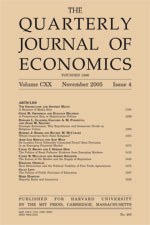
Buser, T., Niederle, M. and Oosterbeek, H. (2014). Gender, competitiveness and career choices Quarterly Journal of Economics, 129(3):1409--1447.
-
Affiliated authors
-
Publication year2014
-
JournalQuarterly Journal of Economics
Gender differences in competitiveness have been hypothesized as a potential explanation for gender differences in education and labor market outcomes. We examine the predictive power of a standard laboratory experimental measure of competitiveness for the later important choice of academic track of secondary school students in the Netherlands. Although boys and girls display similar levels of academic ability, boys choose substantially more prestigious academic tracks, where more prestigious tracks are more math- and science-intensive. Our experimental measure shows that boys are also substantially more competitive than girls. We find that competitiveness is strongly positively correlated with choosing more prestigious academic tracks even conditional on academic ability. Most important, we find that the gender difference in competitiveness accounts for a substantial portion (about 20%) of the gender difference in track choice